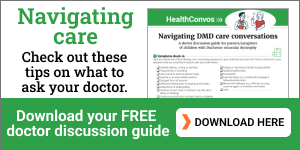 Discussion
Discussion
In it together: How one family is navigating Duchenne MD
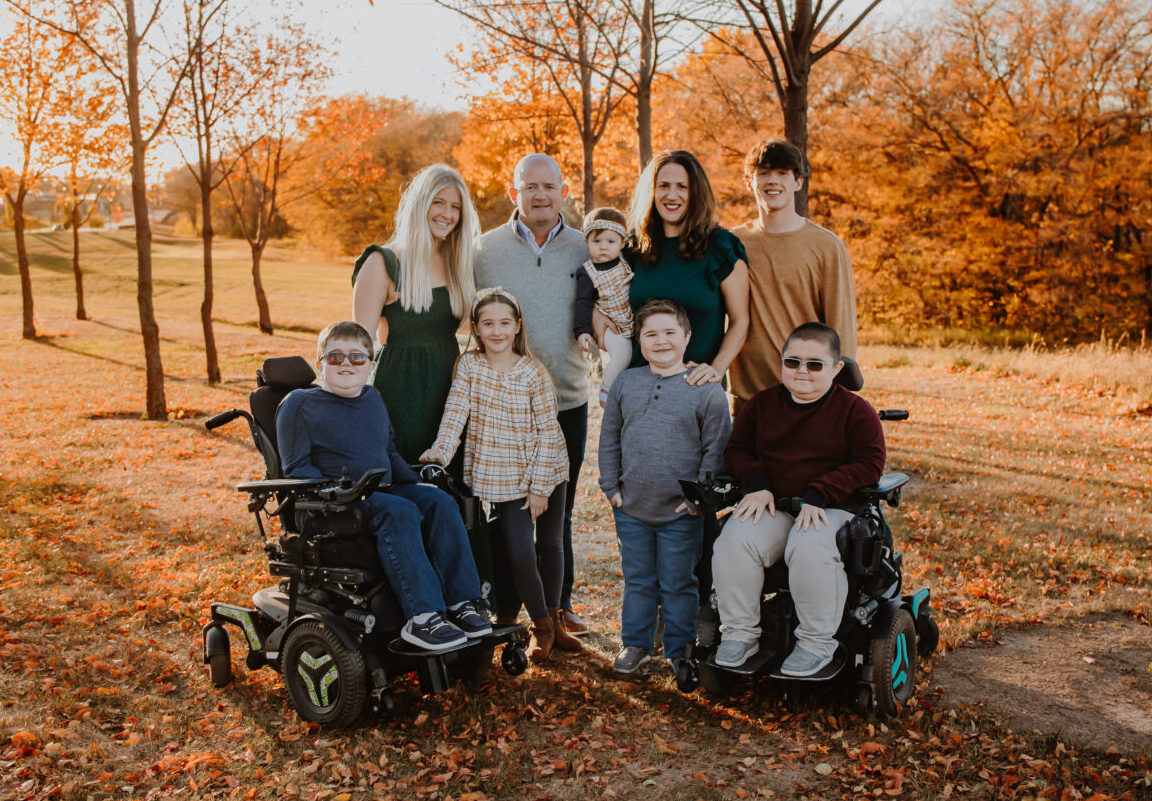
The Vertin family; front row, from left: Max, Mary, and Charlie, Rowen; second row, from left, Lexi, Jason, Callie, Betty, and Chance. (Photos courtesy of Betty Vertin)
In July 2010, I discovered my role as a mother would also encompass that of a caregiver when my sons, Max, 17; Rowen, 14; and Charlie, 12, were diagnosed with Duchenne muscular dystrophy (DMD). Being a caregiver has impacted my family. While there are challenges, it has brought us closer in many other ways.
Parenting challenges
I love the honor of caring for my children. It is physically hard and emotionally demanding, but the bond created is profound. My happiness rests in knowing my sons are cared for.
However, there is heartache from parenting children who gradually deteriorate. My husband, Jason, and I helped my children conquer skills months after their peers and watched them lose those abilities decades before their peers.
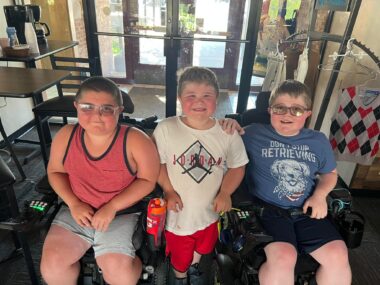
Rowen, Charlie, and Max Vertin, three brothers with Duchenne muscular dystrophy, at a golf tournament in summer 2022.
Additionally, parenting has become something much different from what I had initially planned. As a young parent, I imagined my children would gain independence. I imagined my days of helping in the bathroom and getting kids ready for bed would have passed by the time they reached high school.
But as my children with DMD get older, so do I, and the body I had in my 20s was much more capable of lifting, transferring, and helping in the middle of the night than my now 43-year-old body. However, I dread the day they no longer need me because it could mean Duchenne has taken them. I would give up anything to keep them healthy, free from the disease’s progression, and the ability to outlive me. It is a heavy load to carry.
My sons have four siblings: Lexi, 22; Chance, 16; Mary, 8; and Callie, 17 months. It requires balancing between catering to the unique needs of DMD and letting the siblings live their lives, too. It often feels like living a half-life. Our children with DMD get half, and their siblings get another half, and we are never fully there for any of them or the lives they are living. It affects all our children.
Sibling experiences
To say that my children who do not have Duchenne are unaffected is inaccurate. From a mother’s point of view, I know they have all struggled with how much attention I give their siblings. They have had to attend appointments and overhear conversations about their brothers.
We have done our best to get the other kids involved in activities and support them as much as possible, but the truth is that Duchenne demands our time. My children without DMD have often had to take a back seat to the disease.
And that is what I expected Lexi, Chance, and Mary to tell me when I asked them about it. But, even as children, and it is true for most DMD siblings I’ve met, they understand what their brothers are experiencing. They want us, their parents, to give their brothers what they need and have willingly sacrificed.
Chance, my only son who does not have DMD, has known his brothers have the disease all his life. He is the second of four boys, all born within five years of one another. They have always been close. But as DMD has progressed in each of his brothers, it has changed because he does more than them.
“Caring for the boys is not a challenge. I’m used to it; it is normal,” Chance said. “The challenging part for me is when they watch me do things they can’t. I worry that it hurts them to see it and that they wish they could do it, too.”
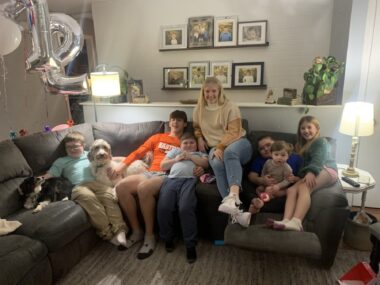
The Vertin kids — from left, Max, Chance, Charlie, Lexi, Rowen holding Callie, and Mary — all together at a birthday party.
My oldest, Lexi, has lived 90 minutes away at college for four years. When Lexi lived at home, all her brothers were still walking, but Max and Rowen have lost ambulation and now require much more care than they needed when she lived with us.
When we discovered the boys had DMD, Lexi was 9 years old, and she watched the diagnosis flip our world upside down. I’ve worried about the impact that has had on her, yet during our discussion, she told me: “Duchenne was part of our life, but the boys were little and seemed like everyone else their age. The hard part is being away and watching them get worse and not being there to help or be able to do anything to stop it.”
It is also different for her than Chance because he lives here, sees the day to day, and is more involved with the care.
“When I come home, they don’t want their big sister helping them in the bathroom but are more comfortable with Chance’s help,” Lexi said.
Each of my children without DMD experience it differently based on where they are in the family order and their age. Mary said it is challenging for her when she wants to go to a trampoline park but can’t because it is unfair to her brothers.
Family connections
Lexi, Chance, and Mary all have one sentiment in common. It is tough to accept when others are mean to their brothers. It makes them very protective of Max, Rowen, and Charlie. My children are one another’s friends and their protectors. In fact, Lexi and Chance both shared that if they are dating someone who doesn’t accept their brothers, it would be easy to walk away.
Connections in our family look different, but they can be wonderful, especially when things are hard. I especially notice this in the close relationship Rowen has with his two younger sisters.
They share a special bond. I often joked when Mary was young that she was like a service toddler because she was wherever Rowen was, riding in his wheelchair, picking up anything dropped, or getting him snacks.
Similarly, Callie means a lot to Max. “When Callie climbs on my wheelchair and sits on my lap, it makes me happy because before I was in a chair, I wasn’t strong enough to hold her,” Max said. “It makes me feel good about being a brother.”
And Chance admitted that it can be difficult because he does so many activities that his brothers cannot, but “when I do connect with my brothers, it is a strong connection, like watching and talking about sports with Rowen,” he says.
Family as a support system
Our family is large. Often, I get asked how I can handle having multiple children with DMD.
I best sum it up by saying, “My hands are full, but my heart is fuller.” It is true for my children as well. They are not perfect; they are not all healthy. But my children are happy.
And the amount of love in our family has everything to do with it. The sheer size of mine — nine total people all loving one another — makes a difference. Our family’s support is as therapeutic to my children’s health as the list of medications they take daily.
And because DMD is isolating, our large family fills in some of that void. In addition to stealing strength and abilities from Max, Rowen, and Charlie, it has also taken away their social life. Being in a busy house with their siblings’ friends coming and going and their various activities gives us people to interact with and places to go.
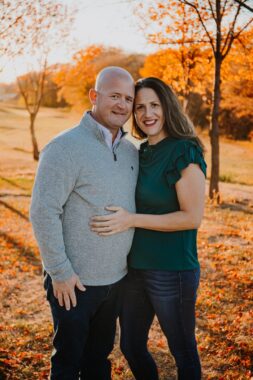
Betty and her husband, Jason, in fall 2022.
Relationships
My marriage is extremely important to me. Early on, I remember hearing about divorce among DMD parents. Financial strain, stress, exhaustion, depression, and grief can create problems in the healthiest marriages.
Jason and I married in our early 20s and were barely 30 when our boys were diagnosed. Everything we learned about DMD scared us. We were frightened at the thought of losing the boys and each other.
We promised we wouldn’t let our marriage be a casualty. It hasn’t been easy, but we’ve remained committed to making our marriage last.
It has taught me some things about our relationship: We both respond differently to Duchenne, but that doesn’t mean it’s not affecting us. We process in our own way, must be patient, and let the process work itself out. I wish someone had told me that — it would have saved me many tears and arguments.
Also, caregiving is easier together. I can’t imagine how difficult it would be without my husband. We recognize and appreciate how much the other does.
It has created a unique connection between two people caring for their flesh and blood together. We recognize that not every couple will share this responsibility and love, and we cherish the gift.
In 2010, my children were all so young. I never dreamed I’d be having these discussions with them, but it has solidified my belief that Duchenne has made us closer. Our relationships and the willingness of each family member to care for and help Max, Rowen, and Charlie reminds me of how close we are.
Muscular Dystrophy News Today is strictly a news and information website about the disease. It does not provide medical advice, diagnosis or treatment. This content is not intended to be a substitute for professional medical advice, diagnosis, or treatment. Always seek the advice of your physician or other qualified health provider with any questions you may have regarding a medical condition. Never disregard professional medical advice or delay in seeking it because of something you have read on this website.
About the Author
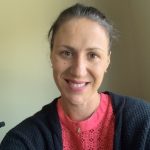
Betty Vertin is a mother and writer living in rural Hastings, Nebraska, with her husband and seven children. Betty is a caregiver to three sons, Max, Rowen, and Charlie. Her oldest was diagnosed with Duchenne muscular dystrophy in 2010 at 4 years old. The other boys were diagnosed with the same in the following year. Although Duchenne occasionally crashes the party, it has not kept her large family from celebrating and enjoying life. She writes her column in hopes of sharing her family’s experiences with others on a similar journey.
Recent Posts
- Guest Voice: Despite losses from Duchenne MD, I persevere
- I rarely answer honestly when asked, ‘How are the boys doing?’
- Trial testing gene-editing therapy PBGENE-DMD gets FDA green light
- A winter blizzard had me cooped up at home for days
- New Phase 3 trial of Duchenne gene therapy SGT-003 to begin dosing
Related Articles
-
 Discussion
Discussion
-
-
-
